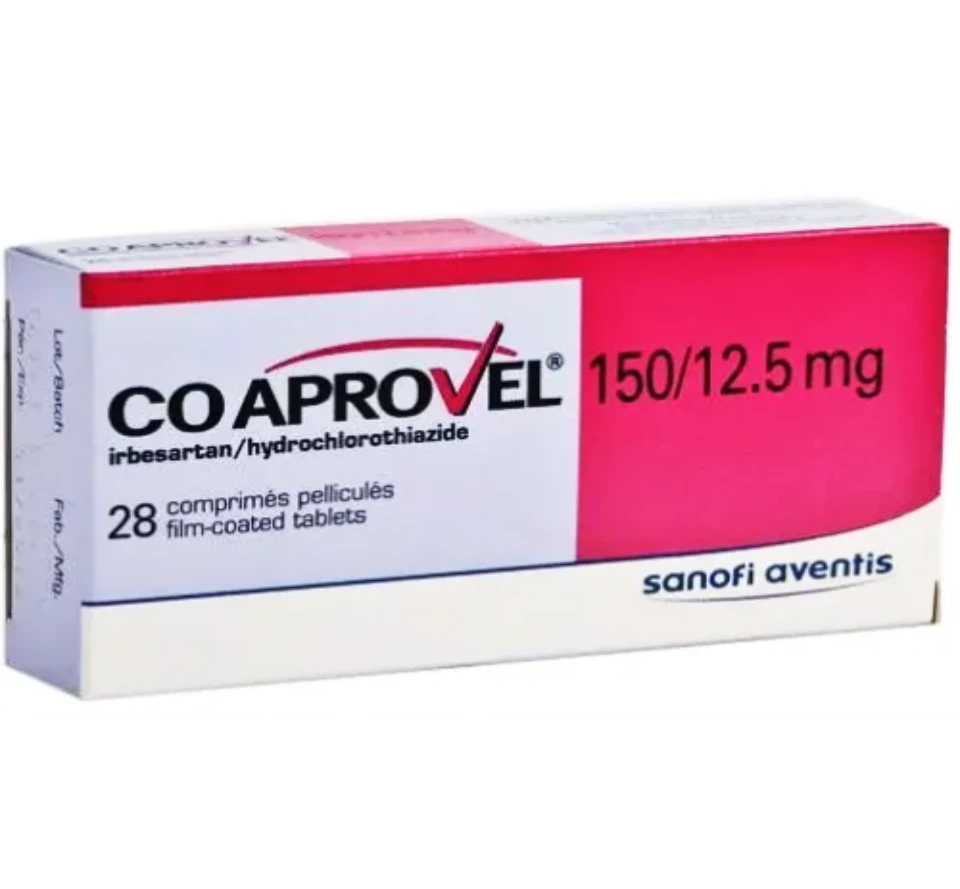Description
Description
SPECIFICATION
150/12.5mg , 300/12.5mg & 300/25mg
Generics
Irbesartan , Hydrochlorothiazide
About
Irbesartan : Irbesartan is a potent, orally active, selective angiotensin-II receptor (type AT1) antagonist. It is expected to block all actions of angiotensin-II mediated by the AT1 receptor, regardless of the source or route of synthesis of angiotensin-II. Hydrochlorothiazide is a thiazide diuretic. The mechanism of antihypertensive effect of thiazide diuretic is not fully known. Thiazides affect the renal tubular mechanisms of electrolyte reabsorption, directly increasing excretion of sodium and chloride in approximately equivalent amounts. The diuretic action of hydrochlorothiazide reduces plasma volume, increases plasma renin activity, increases aldosterone secretion, with consequent increases in urinary potassium and bicarbonate loss, and decreases in serum potassium. Presumably through blockade of the renin-angiotensin-aldosterone system, co-administration of irbesartan tends to reverse the potassium loss associated with these diuretics. With hydrochlorothiazide, onset of diuresis occurs in 2 hours, and peak effect occurs at about 4 hours, while the action persists for approximately 6-12 hours.
Indication
Treatment of essential hypertension.
Side Effects
Cardiac disorders: Common: increases in blood urea nitrogen (BUN), creatinine and creatine kinase Uncommon: decreases in serum potassium and sodium .Uncommon: syncope, hypotension, tachycardia, oedema.Nervous system disorders: Common: dizziness Uncommon: orthostatic dizziness Not known: headache . Ear and labyrinth disorders: Not known: tinnitus. Respiratory, thoracic and mediastinal disorders: Not known: cough. Gastrointestinal disorders: Common: nausea/vomiting , Uncommon: diarrhoea , Not known: dyspepsia, dysgeusia .
Drug Interactions
Irbesartan : Lithium , kaliuretic diuretics, laxatives, amphotericin, carbenoxolone, penicillin G sodium , heparin sodium , digitalis glycosides, antiarrhythmics , selective COX-2 inhibitors, acetylsalicylic acid , Hydrochlorothiazide: Thiazide diuretics , Alcohol , Antidiabetic medicinal products (oral agents and insulins) , Colestyramine and Colestipol resins , Corticosteroids, ACTH , Digitalis glycoside , Pressor amines (e.g. noradrenaline) , tubocurarine , probenecid or sulfinpyrazone , calcium supplements or calcium sparing medicinal products (e.g. vitamin D therapy) , Carbamazepine , atropine, beperiden , cyclophosphamide, methotrexate.
When not to Use
- Hypersensitivity to the active substances or to any of the excipients or to other sulfonamide-derived substances (hydrochlorothiazide is a sulfonamide-derived substance)• Second and third trimesters of pregnancy.• Severe renal impairment (creatinine clearance <30 ml/min).• Refractory hypokalaemia, hypercalcaemia.• Severe hepatic impairment, biliary cirrhosis and cholestasis.• The concomitant use of Irbesartan/Hydrochlorothiazide with aliskiren-containing products is contraindicated in patients with diabetes mellitus or renal impairment (creatinine clearance <60ml/min/1.73 m²).• Due to its HCT component Irbesartan/HCT tablets are contraindicated in anuric patients
Precaution
There is an increased risk of severe hypotension and renal insufficiency when patients with bilateral renal artery stenosis or stenosis of the artery to a single functioning kidney are treated with angiotensin converting enzyme inhibitors or angiotensin-II receptor antagonists. While this is not documented with Irbesartan/Hydrochlorothiazide , a similar effect should be anticipated.

